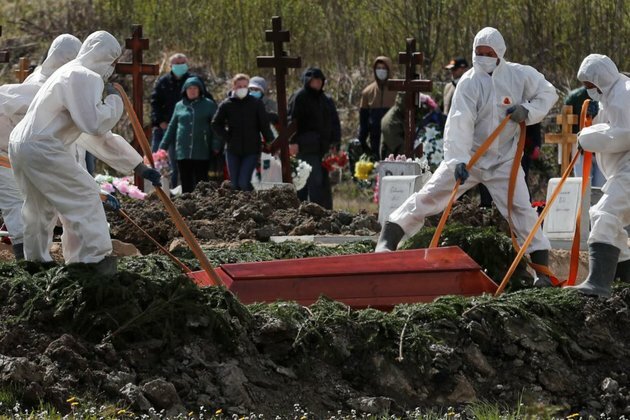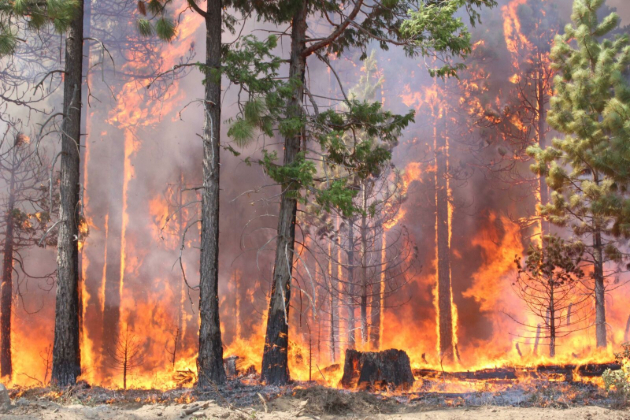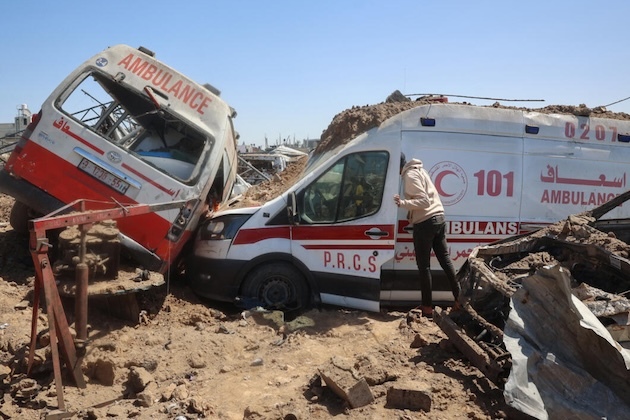Counting The Dead: How Do Countries Tally the Toll From COVID-19?
RFE
20 May 2020, 23:45 GMT+10

The United States and Russia have the two highest numbers of cumulative, confirmed coronavirus cases in the world.
As of May 20, the United States also has the highest official death toll.
Russia, however, is ranked 19th for its reported number of coronavirus fatalities, and its statistics are increasingly under scrutiny from experts who suspect something's not quite right with Moscow's methodology.
Is the United States overcounting its coronavirus deaths? Is Russia undercounting?
Most countries around the world try to adhere to the guidelines set out by the World Health Organization (WHO) for classifying coronavirus deaths: 'a death due to COVID-19 may not be attributed to another disease (e.g. cancer) and should be counted independently of preexisting conditions that are suspected of triggering a severe course of COVID-19.'
In other words, if a person has a heart condition, then acquires the coronavirus, and later dies, it should be classified as a coronavirus death. The same for diabetes or respiratory illnesses like pneumonia.
'When studying the pandemic, you should count as much as possible, then you can classify the cases otherwise later on,' said Steven Van Gucht, a virologist at Belgium's main public health institution, Sciensano.
Experts say there are a mix of explanations why coronavirus fatality statistics vary, some a function of longstanding, institutional practices and traditions within countries; some potentially a function of politics.
According to Johns Hopkins University, the U.S. institution whose database on infections is considered one of the most authoritative, differences in mortality numbers can be caused by things like the number of tests performed in a population: the more testing there is, the more people with milder cases are identified, and this then lowers the ratio of cases to fatalities.
Also, the older or sicker a population is, the higher mortality rates are likely to be. And each country's health-care system is a factor: The number and quality of hospitals and doctors, for example, affects how infected patients are treated and whether they recover.
A gravedigger wearing a protective suit stands by a grave during the burial of a COVID-19 victim on the outskirts of Moscow on May 15.
In the United States, the Centers for Disease Control and Prevention -- the lead government agency for health and disease responses -- says its statistics are based on numbers entered into the National Vital Statistics System, from all 50 U.S. states.
Among the statistics' shortcomings are the lag time: Several weeks can elapse before a COVID-19 death will be processed, coded, and tabulated, and then be reflected in national figures.
Call It COVID-19
In Russia, there's a more fundamental issue, with mounting evidence that the deaths of many people infected with the coronavirus have been attributed to other diseases or conditions.
Yelena Malinnikova, the Health Ministry's chief of infectious diseases, argued on May 4 that the low mortality was due to testing and quick detection.
SEE ALSO: Why Is Russia's Coronavirus Death Toll So Low?
Russia has been praised for its wide national testing program, with more than 7.5 million tests conducted.
But Russia's official figures, already under scrutiny, drew more attention earlier this month when news media including The Moscow Times, The New York Times, and the Financial Times, examined preliminary fatality rates for Moscow for April, and discovered they were markedly above average. That has prompted angry denunciations from the Foreign Ministry.
Russia's WHO representative has also downplayed doubts about the country's tallies.
Gravediggers wearing personal protective equipment carry a coffin while burying a COVID-19 victim near St. Petersburg on May 6.
Mikhail Tamm, an associate professor of Moscow State University and Moscow's Higher School of Economics, told RFE/RL's Russian Service that there was a twofold discrepancy in such deaths in some Russian regions, as local agencies tally and report statistics.
In Moscow, Tamm noted, the city Department of Health said that more than 60 percent of patients infected with the coronavirus were not included in the death statistics. The coronavirus was considered only a 'catalyst' for the development of other diseases.
Whether that is a deliberate political decision -- perhaps to minimize the perception that Russia is suffering disproportionately -- is an open question.
'We can say that there are several factors' in Russia's unusually low fatalities, Tamm said, 'but only one of them, which the Moscow authorities openly wrote about, allows us to assess how great an understatement [it] is.'
Death Rates, Death Counts
Other countries whose overall coronavirus numbers have come into question include Iran, which as recently as early April was one of the leading countries for confirmed. Last month, the country stopped publishing provincial figures, even as authorities noted 'a rising trend or the beginning of a peak' in eight regions.
As of May 20, the country had reported 7,119 deaths, according to the Johns Hopkins University database, which relies on reports from countries' governments for its figures.
SEE ALSO: Here's Why The Numbers Don't Tell The Real Story Of The Coronavirus Pandemic
On the flipside are countries like Belgium, which is only seventh in the ranking of deaths, with 9,108, but instead has the world's highest fatality rate: 79.50 per 100,000 people.
By comparison, the U.S. rate is about one-third that: 27.61. Russia's is 1.88 per 100,000 people.
A Belgian government spokesman, Yves Van Laethem, earlier this month tried to dispel perceptions that the country was exceptionally ravaged by the disease. The reason is that authorities track 'excess deaths' for the period that the coronavirus has been in the country.
A mortuary worker wears protective gear during the coronavirus pandemic in Brussels in April.
That figure is the number of deaths in excess of what would otherwise be expected for the same period, based on past statistics - similar to what reporters found for Moscow in April.
'Our way of counting things is the most scientifically correct and honest,' Van Laethem was quoted as saying on May 15.
The Belgian virologist, Van Gucht, said that, because the coronavirus that causes COVID-19 was so new when it emerged, many countries did not know how best to respond or how to classify and tally deaths. That's changed as more information and data have been generated.
'It's a bit silly that countries are worried about their image, because a virus, it's nobody's fault, it's a force of nature, you try to deal with it,' Van Gucht told RFE/RL. 'It's become too much of a competition between countries, about their image.'
'It's a bit of a political issue, because we as scientists, in public health, we don't care if one country looks better or worse than other countries,' he said. 'We just much want as much data as possible, as soon as possible
Virus Politics?
And then there are countries whose statistics are beyond implausible: Turkmenistan to this day has not reported any coronavirus cases at all, despite being surrounded by countries that have.
The World Health Organization itself has come under severe criticism from U.S. President Donald Trump's administration and from other governments. Much of the criticism has focused on the organization's interactions with China, where the disease first emerged in November and December, and on the perception that it has provided political cover for authoritarian governments.
Its local representatives have also come under fire, for example, in Tajikistan, where authorities insisted there were no cases for weeks, a position endorsed by the WHO's representative there, and its president flouted warnings from international experts to order social-distancing restrictions or other measures aimed at curtailing any spread of the disease.
On April 30, however, Tajik authorities announced the country's first cases; as of May 19, there were nearly 2,000 confirmed cases and 41 deaths.
James Aldworth, a spokeswoman at WHO's global headquarters in Geneva, told RFE/RL that the variation in data is partly explained by differences in reporting methods and testing strategies from one country to another.
'It is therefore not unusual to see the data on severity vary from one area to another as the local context plays a role in the spread and scale of infection of the disease,' he told RFE/RL in an e-mail.
'Many countries are in fact struggling to capture the deaths that are occurring due to COVID-19,' he said.
Aldworth did not respond to questions about whether WHO has in some cases provided political cover for authoritarian governments concerned about negative media coverage on the coronavirus.
Copyright (c) 2018. RFE/RL, Inc. Republished with the permission of Radio Free Europe/Radio Liberty, 1201 Connecticut Ave NW, Ste 400, Washington DC 20036
 Share
Share
 Tweet
Tweet
 Share
Share
 Flip
Flip
 Email
Email
Watch latest videos
Subscribe and Follow
Get a daily dose of Afghanistan Sun news through our daily email, its complimentary and keeps you fully up to date with world and business news as well.
News RELEASES
Publish news of your business, community or sports group, personnel appointments, major event and more by submitting a news release to Afghanistan Sun.
More InformationInternational
SectionWildfires rage in Carolinas as dry winds, downed trees fuel flames
RALEIGH/COLUMBIA: Dry weather, strong winds, and fallen trees from Hurricane Helene have sparked wildfires in North Carolina and South...
Red Cross outraged after killing of Gazan ambulance crews
GENEVA,.Switzerland - The International Federation of Red Cross and Red Crescent Societies (IFRC) has expressed profound outrage following...
Tesla to launch in Saudi Arabia next month after years of tension
RIYADH, Saudi Arabia: Tesla is finally entering Saudi Arabia, with a launch scheduled for next month—marking a significant shift in...
Apple likely to escape EU fine after browser changes
BRUSSELS, Belgium: Apple appears to have dodged a major regulatory setback in Europe, following recent changes to how users select...
FBI probing increased violence against Tesla
WASHINGTON, D.C: FBI Director Kash Patel said this week the bureau was probing what he called the increase in violent activity toward...
Alarm over nine Red Cross personnel going missing in Gaza
GAZA - Israel is refusing to allow search parties to access an area where 9 Red Cross ambulance crew members have gone missing in Gaza....
Central Asia
Section60"FlyOverChina | Spring thaw comes to Laoniuwan section of Yellow River in N China
HOHHOT, April 1 (Xinhua) -- The Laoniuwan section of the Yellow River is located on the border between north China's Shanxi Province...
EU Faces Crossroads On Russia Sanctions As Rubio's NATO Debut Looms
Welcome to Wider Europe, RFE/RL's newsletter focusing on the key issues concerning the European Union, NATO, and other institutions...
TAJIKISTAN-KHUJAND-NOWRUZ FESTIVAL-CELEBRATION
(250401) -- KHUJAND, April 1, 2025 (Xinhua) -- A grand celebration to mark the Nowruz Festival is held in Khujand, Tajikistan, March...
Azerbaijan approves import of fruit from Israel
Tel Aviv [Israel], April 1 (ANI/TPS): The Plant Protection and Inspection Services at Israel's Ministry of Agriculture and Food Security...
US Dept of State welcomes release of citizen Faye Hall from Taliban's captivity
Washington DC [US], March 31 (ANI): The US Department of State welcomed the release of American citizen Faye Hall, who was recently...
World Boxing Cup Brazil 2025: Sachin, Vishal through to semis, Lakshya Chahar to kick off India's campaign against Olympian Wanderley Pereira of Brazil
Foz do Iguacu [Brazil], March 31 (ANI): The Indian men's contingent at the much-anticipated World Boxing Cup 2025 to be played in Brazil...













